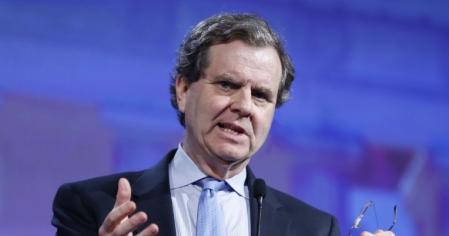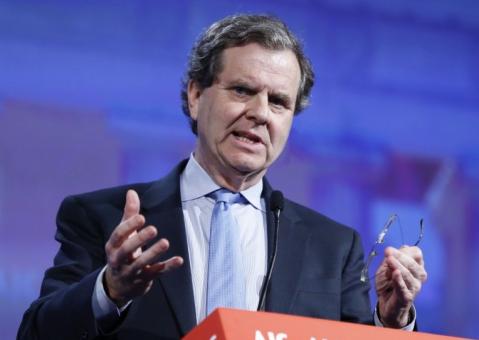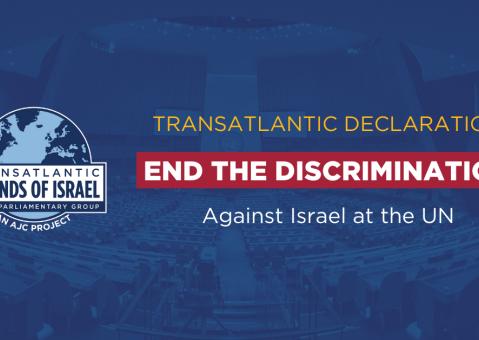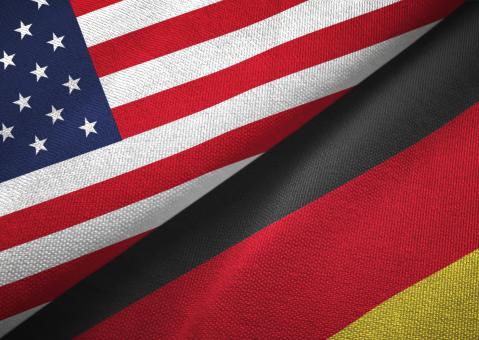Share on
By David Harris, Chief Executive Officer of AJC
In the wake of the unprecedented tragedy of the Holocaust, it was anything but obvious that a Jewish group would seek to engage postwar Germany. But that’s exactly what American Jewish Committee (AJC), alone among global Jewish organizations, did. Others largely shunned Germany, wishing it to go into oblivion.
Why? It was certainly not for lack of understanding of what happened during the 12-year reign of the Third Reich. The immense human toll was all too well known, as was the enormity of the Final Solution against the Jews. The liberation of the concentration camps, from Auschwitz-Birkenau to Mauthausen, revealed the horrific truths. The horrors were all-enveloping, the pain searing.
Rather, it was for one simple reason: AJC leaders understood that Germany could not be wished into oblivion, any more than it could be transformed into a permanently weak, agricultural country, as some American officials unsuccessfully tried to persuade the White House at the time.
Sooner or later, Germany would re-emerge on the European and global stages. Would that Germany be another tyrannical, aggressive nation, triggering yet more war, or would it be a democratic and peaceful country, cooperating with its neighbors and contributing to a more stable world?
The answer was anything but obvious in the 1940s. AJC leaders at the time grasped the essential fact that they could not sit on the sidelines and wait for the unfolding of history to reveal the answer to the question. Too much was at stake. They needed to get involved in trying to help ensure that the answer was an unambiguously democratic and pacific Germany.
Over the next seven decades, step by step, a remarkable story developed. It began as an effort, with the help of the American occupation authorities, to introduce programs for Germans on democracy, mutual respect, denazification, and anti-antisemitism.
That wasn’t easy, and the process was anything but linear.
Not every German was prepared to renounce overnight the ideology that had driven so many from 1933 to 1945. Nor was every German suddenly prepared to take lessons from Americans, much less American Jews, on how to live their lives going forward. And in a ravaged country, with cities destroyed, economic infrastructure crippled, refugees on the march, and adequate food an ever-present issue, not everyone’s first priority was necessarily the embrace of a new value system.
But with the passage of time, and the help of inspired leaders, including, notably, Chancellor Konrad Adenauer, the first signs of progress were achieved.
Beginning in 1949, West Germany established a democracy, which has proved remarkably resilient. Through the brilliant vision of two Frenchmen, Robert Schuman and Jean Monnet, the first seeds of European integration were planted and, centrally, of course, included West Germany, as the project’s main objective was to prevent another war in Europe. The United States helped immeasurably in getting Germany back on its feet, bolstering democratic institutions, defending its security, and becoming a staunch ally. To the surprise of many, a Jewish community in Germany was reborn and took root in several cities. And the establishment in 1965 of formal diplomatic ties between Germany and Israel was another postwar milestone.
All of this underscored AJC’s investment in postwar Germany and belief in the possibility, however remote it may have seemed on May 8, 1945, that a promising new chapter could be written.
As the years passed, the AJC involvement became both deeper and more varied.
In 1980, for example, it partnered with the Konrad Adenauer Foundation to establish an annual exchange program, now in its 40th year, bringing American Jewish leaders to Germany for study tours, and emerging German leaders to the United States to understand American Jewish life. That was followed by partnerships with the Friedrich Ebert and Friedrich Naumann foundations.
In 1990, strengthened by more than four decades of deepening engagement, AJC became the first international Jewish organization to support publicly German reunification.
In 1994, a seemingly improbable relationship was established with the Bundeswehr that is now in its 26th year. It led to joint cooperation in assisting refugees from Kosovo, driven out by ethnic cleansing, among other initiatives.
In 1998, AJC became the first American Jewish group to open a permanent office in Berlin.
And in 2019, AJC announced that the organization’s annual Global Forum, which draws thousands of participants, would be held in Berlin in June 2020. This was to be the first time since the organization’s founding in 1906 that it would take place in Europe, much less in Germany.
The rationale for this historic decision was that 2020 coincided with the 75th anniversary of the end of the Second World War. It was the right time to look back and remember the dark past, to assess the remarkable road traveled since 1945, to take stock of where things stand today, and to plan for the future. The topics to be examined included the transatlantic partnership; European integration and solidarity; rising antisemitism around the world; fading Holocaust memory; Israel and Europe; and the health of democratic values.
Alas, the pandemic forced cancellation of this gathering. It was a painful decision. The Global Forum was sold-out, the list of confirmed speakers was long, and the experience would have taken participants out of the conference center and to such venues as Sachsenhausen and the Brandenburg Gate for program sessions.
Fortunately, all is not lost. Thanks to technology, a Virtual Global Forum will take place instead from June 14 to 18. It may not have quite the emotional power of actually being in Berlin, but will permit an exploration of timely issues — and an affirmation of the unique bond that has been forged between Germany and AJC over the past 75 years.
May that bond serve as an inspiring case study in the possibilities of progress for nations and people everywhere.
This article originally appeared in Welt am Sonntag.




